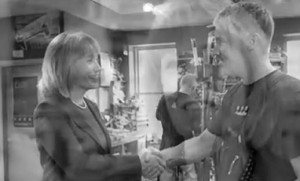Outside Spending on New Hampshire Governor’s Race Continues To Rise
This following was contributed by Brian Wallstin.
In what will likely be the most expensive gubernatorial campaign in New Hampshire history, independent political groups supporting candidates Maggie Hassan and Ovide Lamontagne have reserved nearly $7.5 million worth of television ads in the final month of the election.
Between now and November 6, several pro-Democratic groups supporting Hassan have reserved about $4.4 million in air time in four television markets that reach New Hampshire viewers — Manchester, Boston, Burlington, Vt., and Portland. Support for Lamontagne has so far come from a single group, the Live Free PAC, an affiliate of the Republican Governors Association that has committed just over $3 million for television ads.
According to the projections, which were provided by the Democratic Governors Association, independent groups supporting the two candidates will have spent nearly $11 million on television ads between the September 11 primary and Election Day. A spokesman for the RGA declined to discuss the group’s media strategy, but he confirmed that the RGA’s total investment in television ads during the general election will exceed $4 million.
The scope of the projected media buys are subject to change, based on the priorities of the groups paying for the ads and whether the race remains as tight as it is right now. But it is almost certain that, in the end, the total expenditures will far exceed spending by independent political groups in the 2010 governor’s race.
During that contest, well-funded outside groups, including both governors associations, the National Organization for Marriage and Citizens for Strength and Security, a pro-Democratic group funded by the DGA and labor unions, spent less than $3 million on television advertising.In the past, gubernatorial candidates relied primarily on direct contributions or, in some cases, tapped their personal wealth to fund their campaigns. In 2002, Republican Craig Benson became governor after spending $10 million of his own money, most of it during the primary. Of the $3 million Lynch raised on his way to beating Benson in 2004, $2.1 million came from his own pocket. He also spent $850,000 in 2010, more than 40 percent of the total raised by his campaign.
Hassan and Lamontagne don’t have the same financial resources to self-finance their campaigns, nor would they have to resort to such measures in the wake of the 2010 Supreme Court ruling in the Citizens United case, which opened the door for political groups acting independently of candidates to spend unlimited funds on an election.
Indeed, according to the DGA’s calculations, after spending more than $1 million each to win their primaries, Hassan and Lamontagne have spent less than $150,000 combined on television ads in the general election.
Hassan’s campaign began the general election with less than $17,000 on hand, compared to Lamontagne’s $258,000. But so far, outside groups appear to have more than made up the difference.
Hassan’s biggest backer, the New Hampshire Freedom Fund, an affiliate of the DGA, has so far reserved $2,545,000 in air time for the final month of the campaign. The New Hampshire Democratic Party has committed $418,000 for ads that will run on Manchester’s WMUR.
Hassan will also benefit from ads paid for by two labor unions: The Service Employees International has reserved more than $862,000 in ads that will run in the Boston market starting next week. The American Federation of State, County and Municipal Employees will spend about $464,000 in the final two weeks of the campaign, nearly all of it on WMUR, according to the DGA.
This week, Women Vote, a Super PAC created by Emily’s List, which supports pro-choice candidates, began running 30-second spots on WMUR that attack Lamontagne’s position on abortion. So far, the group has spent $155,000, according to television contracts filed with the Federal Communications Commission; the ads will also run on radio for two weeks.
Most of the air time reserved by the Live Free PAC in support of Lamontagne is aimed at viewers in New Hampshire’s southern tier. The group has reserved more than $1.7 million on Boston’s WBZ, while just over $890,000 has been reserved on WMUR.
Meanwhile, Hassan and Lamontagne are continuing to raise funds that, in addition to other campaign expenses, could be used to purchase additional air time. The candidates are due to file their next campaign-finance reports with the Secretary of State’s office next week.


